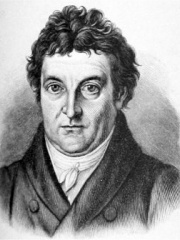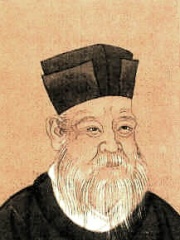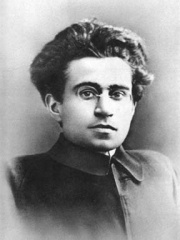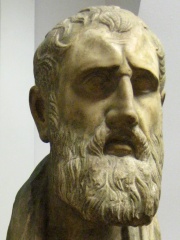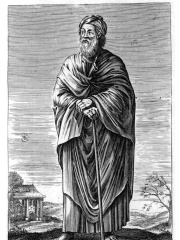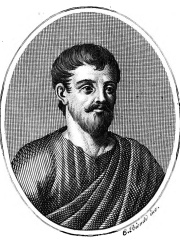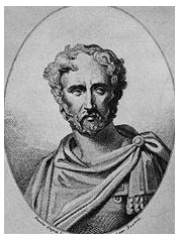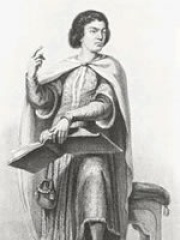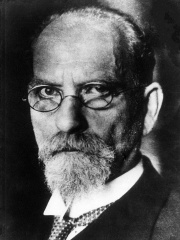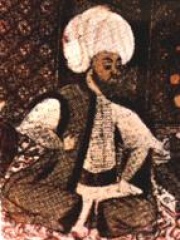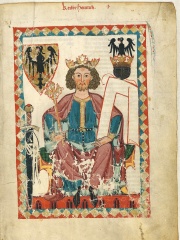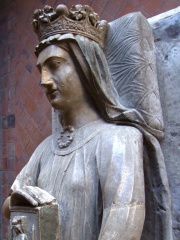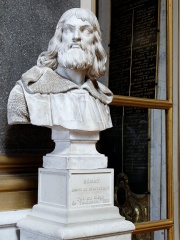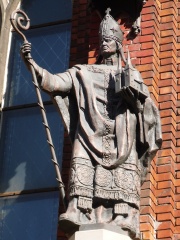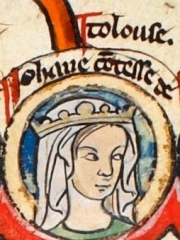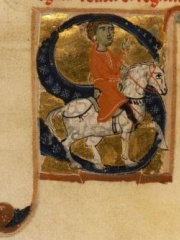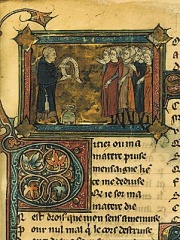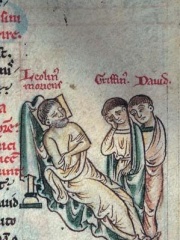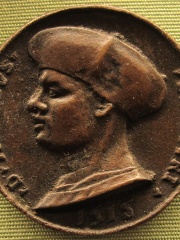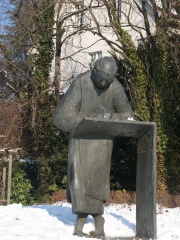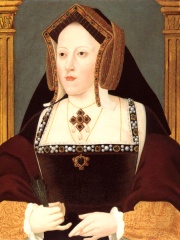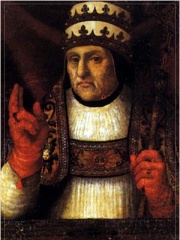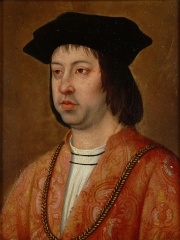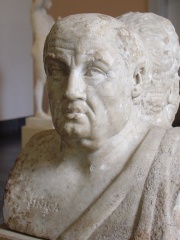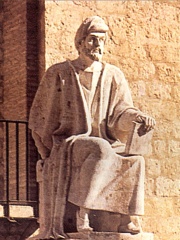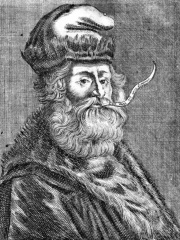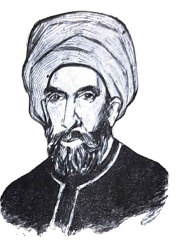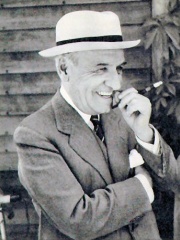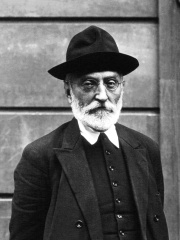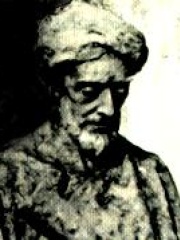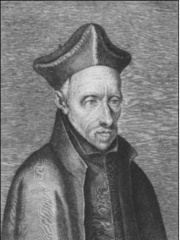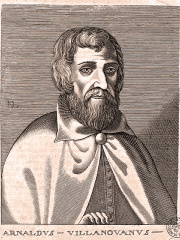PHILOSOPHER
Ibn Arabi
1165 - 1240
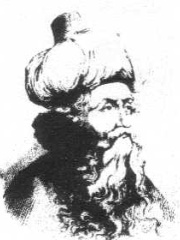
 Ibn Arabi
Ibn Arabi
Ibn Arabi (July 1165–November 1240) was an Andalusian Arab Sunni scholar, Sufi mystic, poet, and philosopher, who exercised notable influence within Islamic thought. Of the 850 works attributed to him, about 700 are considered authentic, and more than 400 are extant. His cosmological teachings became a dominant intellectual framework in many regions of the Muslim world. His traditional title was Muḥyiddīn (Arabic: محيي الدين; The Reviver of Religion). Read more on Wikipedia
His biography is available in 72 different languages on Wikipedia (up from 70 in 2024). Ibn Arabi is the 70th most popular philosopher (down from 62nd in 2024), the 29th most popular biography from Spain (down from 22nd in 2019) and the 3rd most popular Spanish Philosopher.
Ibn Arabi is most famous for his Sufi writings, which are considered to be some of the most influential writings in the Islamic world.
Memorability Metrics
Page views of Ibn Arabi by language
Among PHILOSOPHERS
Among philosophers, Ibn Arabi ranks 70 out of 1,267. Before him are Johann Gottlieb Fichte, Zhu Xi, Antonio Gramsci, Zeno of Citium, Xenophanes, and Gorgias. After him are Nagarjuna, Pliny the Elder, Peter Abelard, Leucippus, Edmund Husserl, and Al-Kindi.
Most Popular Philosophers in Wikipedia
Go to all RankingsJohann Gottlieb Fichte
1762 - 1814
HPI: 81.40
Rank: 64
Zhu Xi
1130 - 1200
HPI: 81.27
Rank: 65
Antonio Gramsci
1891 - 1937
HPI: 80.94
Rank: 66
Zeno of Citium
334 BC - 263 BC
HPI: 80.94
Rank: 67
Xenophanes
570 BC - 475 BC
HPI: 80.90
Rank: 68
Gorgias
483 BC - 375 BC
HPI: 80.90
Rank: 69
Ibn Arabi
1165 - 1240
HPI: 80.85
Rank: 70
Nagarjuna
150 - 250
HPI: 80.71
Rank: 71
Pliny the Elder
23 - 79
HPI: 80.68
Rank: 72
Peter Abelard
1079 - 1142
HPI: 80.63
Rank: 73
Leucippus
500 BC - 500 BC
HPI: 80.59
Rank: 74
Edmund Husserl
1859 - 1938
HPI: 80.57
Rank: 75
Al-Kindi
801 - 866
HPI: 80.39
Rank: 76
Contemporaries
Among people born in 1165, Ibn Arabi ranks 1. After him are Philip II of France, Henry VI, Holy Roman Emperor, Berengaria of Navarre, Simon de Montfort, 5th Earl of Leicester, Albert of Riga, Henry I, Duke of Brabant, Joan of England, Queen of Sicily, Raimbaut de Vaqueiras, Phillipe de Plessis, Jean Bodel, and Waleran III, Duke of Limburg. Among people deceased in 1240, Ibn Arabi ranks 2. Before him is Fibonacci. After him are Razia Sultana, Llywelyn the Great, Constance of Hungary, Raymond Nonnatus, Konrad von Thüringen, Jacques de Vitry, Caesarius of Heisterbach, Chormaqan, Hartmann, Count of Württemberg, and Skule Bårdsson.
Others Born in 1165
Go to all RankingsIbn Arabi
PHILOSOPHER
1165 - 1240
HPI: 80.85
Rank: 1
Philip II of France
POLITICIAN
1165 - 1223
HPI: 80.85
Rank: 2
Henry VI, Holy Roman Emperor
POLITICIAN
1165 - 1197
HPI: 76.61
Rank: 3
Berengaria of Navarre
COMPANION
1165 - 1230
HPI: 71.53
Rank: 4
Simon de Montfort, 5th Earl of Leicester
POLITICIAN
1165 - 1218
HPI: 68.62
Rank: 5
Albert of Riga
PHYSICIAN
1165 - 1229
HPI: 67.92
Rank: 6
Henry I, Duke of Brabant
NOBLEMAN
1165 - 1235
HPI: 67.26
Rank: 7
Joan of England, Queen of Sicily
COMPANION
1165 - 1199
HPI: 67.11
Rank: 8
Raimbaut de Vaqueiras
POLITICIAN
1165 - 1207
HPI: 65.46
Rank: 9
Phillipe de Plessis
POLITICIAN
1165 - 1209
HPI: 64.62
Rank: 10
Jean Bodel
WRITER
1165 - 1205
HPI: 64.53
Rank: 11
Waleran III, Duke of Limburg
POLITICIAN
1165 - 1226
HPI: 63.61
Rank: 12
Others Deceased in 1240
Go to all RankingsFibonacci
MATHEMATICIAN
1170 - 1240
HPI: 89.74
Rank: 1
Ibn Arabi
PHILOSOPHER
1165 - 1240
HPI: 80.85
Rank: 2
Razia Sultana
POLITICIAN
1205 - 1240
HPI: 79.00
Rank: 3
Llywelyn the Great
POLITICIAN
1173 - 1240
HPI: 72.46
Rank: 4
Constance of Hungary
COMPANION
1180 - 1240
HPI: 64.86
Rank: 5
Raymond Nonnatus
RELIGIOUS FIGURE
1204 - 1240
HPI: 64.46
Rank: 6
Konrad von Thüringen
NOBLEMAN
1206 - 1240
HPI: 62.77
Rank: 7
Jacques de Vitry
RELIGIOUS FIGURE
1170 - 1240
HPI: 62.03
Rank: 8
Caesarius of Heisterbach
WRITER
1180 - 1240
HPI: 61.90
Rank: 9
Chormaqan
POLITICIAN
HPI: 61.36
Rank: 10
Hartmann, Count of Württemberg
POLITICIAN
1160 - 1240
HPI: 57.02
Rank: 11
Skule Bårdsson
POLITICIAN
1189 - 1240
HPI: 56.31
Rank: 12
In Spain
Among people born in Spain, Ibn Arabi ranks 29 out of 3,355. Before him are Catherine of Aragon (1485), Pope Callixtus III (1379), Francis Xavier (1506), Maimonides (1138), Ferdinand II of Aragon (1452), and Federico García Lorca (1898). After him are Teresa of Ávila (1515), Philip IV of Spain (1605), Plácido Domingo (1941), Julio Iglesias (1943), Philip III of Spain (1578), and Alfonso XIII of Spain (1886).
Others born in Spain
Go to all RankingsCatherine of Aragon
RELIGIOUS FIGURE
1485 - 1536
HPI: 81.80
Rank: 23
Pope Callixtus III
RELIGIOUS FIGURE
1379 - 1458
HPI: 81.78
Rank: 24
Francis Xavier
RELIGIOUS FIGURE
1506 - 1552
HPI: 81.55
Rank: 25
Maimonides
RELIGIOUS FIGURE
1138 - 1204
HPI: 81.42
Rank: 26
Ferdinand II of Aragon
POLITICIAN
1452 - 1516
HPI: 80.98
Rank: 27
Federico García Lorca
WRITER
1898 - 1936
HPI: 80.92
Rank: 28
Ibn Arabi
PHILOSOPHER
1165 - 1240
HPI: 80.85
Rank: 29
Teresa of Ávila
RELIGIOUS FIGURE
1515 - 1582
HPI: 80.81
Rank: 30
Philip IV of Spain
POLITICIAN
1605 - 1665
HPI: 80.78
Rank: 31
Plácido Domingo
SINGER
1941 - Present
HPI: 80.52
Rank: 32
Julio Iglesias
SINGER
1943 - Present
HPI: 80.18
Rank: 33
Philip III of Spain
POLITICIAN
1578 - 1621
HPI: 79.91
Rank: 34
Alfonso XIII of Spain
POLITICIAN
1886 - 1941
HPI: 79.90
Rank: 35
Among PHILOSOPHERS In Spain
Among philosophers born in Spain, Ibn Arabi ranks 3. Before him are Seneca the Younger (-4), and Averroes (1126). After him are Ramon Llull (1232), Ibn Tufail (1110), José Ortega y Gasset (1883), Miguel de Unamuno (1864), Baltasar Gracián (1601), Solomon ibn Gabirol (1021), Francisco Suárez (1548), Abraham ibn Ezra (1089), and Arnaldus de Villa Nova (1240).
Seneca the Younger
4 BC - 65
HPI: 86.81
Rank: 1
Averroes
1126 - 1198
HPI: 86.05
Rank: 2
Ibn Arabi
1165 - 1240
HPI: 80.85
Rank: 3
Ramon Llull
1232 - 1316
HPI: 77.38
Rank: 4
Ibn Tufail
1110 - 1185
HPI: 75.54
Rank: 5
José Ortega y Gasset
1883 - 1955
HPI: 74.71
Rank: 6
Miguel de Unamuno
1864 - 1936
HPI: 73.57
Rank: 7
Baltasar Gracián
1601 - 1658
HPI: 73.52
Rank: 8
Solomon ibn Gabirol
1021 - 1058
HPI: 73.35
Rank: 9
Francisco Suárez
1548 - 1617
HPI: 73.14
Rank: 10
Abraham ibn Ezra
1089 - 1167
HPI: 71.20
Rank: 11
Arnaldus de Villa Nova
1240 - 1311
HPI: 70.69
Rank: 12
